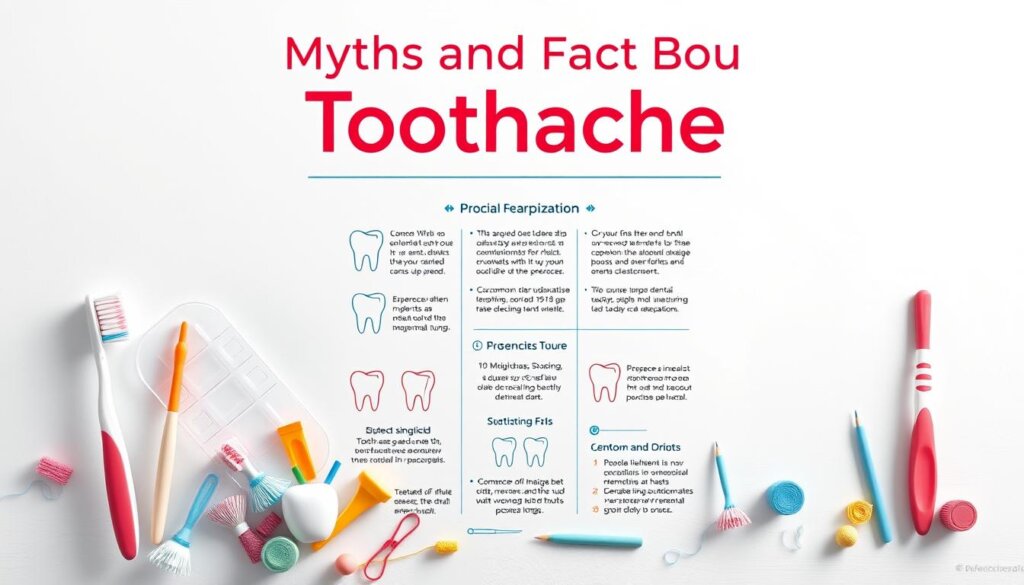Terrible Toothache Relief: What Should I Do?
Did you know that more than 25% of adults in the U.S. have had tooth pain in the last six months? Many describe it as ‘terrible toothache.’ People often ask, “What should I do if I have a terrible toothache?” The first important step is acting fast to ease the pain and stop further problems. If you’re thinking about getting emergency dental help, there are quick fixes you can try at home to lessen the toothache temporarily.
When you’re hit with a terrible toothache, taking over-the-counter pain relievers like ibuprofen or paracetamol helps (but not aspirin for those under 16). You can also use pain-relieving oral gels from the pharmacy for direct relief. Rinsing with warm saltwater can calm the sore nerve. Try to eat soft foods to avoid using the affected tooth too much. Be gentle when you brush, don’t floss near the sore spot, and get professional dental help if things get worse. If there’s swelling or the pain doesn’t go away, don’t drive yourself to the emergency room. Instead, call for an ambulance and have your medication list ready.
Key Takeaways
- Terrible toothache affects a lot of people, hitting a quarter of U.S. adults recently.
- Starting relief steps include taking ibuprofen or paracetamol and using pain-relieving gels.
- Home treatment like rinsing with warm saline solution can help ease the pain for a while.
- In severe situations, it’s crucial to seek professional help and not drive yourself to emergency care.
- Keep a list of your current medicines ready for emergencies to help the dentist understand your health better.
Understanding Toothaches: Common Causes
Toothaches show many dental problems, often needing quick care. Knowing why toothaches happen helps us choose the right remedies and stop worse issues.
Cavities are a top toothache cause, coming from tooth decay. This usually happens from not cleaning teeth well and eating too many sweets and acidic foods. Plaque that turns hard on teeth wears down the enamel. This makes cavities that hurt because they reach the sensitive parts inside.
Gum disease also causes toothaches. It begins as gingivitis, with red, swollen gums that bleed. It can get worse, turning into periodontitis. This severe condition leads to losing bone and tissue around teeth. Both can cause a lot of pain and lead to losing teeth if not treated.
Tooth sensitivity happens when enamel wears down or roots get exposed. Brushing too hard or drinking lots of acidic drinks can make this worse.
A dental abscess is a serious infection near the tooth’s root or between the gum and tooth. It causes a lot of pain and needs quick treatment. If ignored, the infection can spread and become more dangerous.
Knowing about these problems helps us get the right treatment fast and keep our teeth healthy. Catching issues early and using the right remedies for each problem is key.
Stopping toothaches from starting means regular dental visits and good teeth cleaning habits. Learning how daily habits affect our teeth is the first step to keeping them healthy.
Immediate Relief Techniques for Toothache
Tooth pain can really mess up your day and make you feel awful. Here’s how you can quickly ease your toothache. These tips use simple remedies and some over-the-counter meds.
- Over-the-Counter Pain Relievers: Quick relief often comes from meds like ibuprofen and acetaminophen. They ease pain and fight swelling. But, don’t put aspirin right on your sore tooth or gums. It might irritate them more.
- Cold Compress Application: A cold compress can be a big help, especially if your toothache comes from an injury. Place it outside your cheek where it hurts. Do this soon after the pain starts, within the first day or so, for the best effect.
- Clove Oil for Natural Relief: Clove oil is a proven remedy for toothaches. It numbs pain and fights germs because of eugenol. Put some on a cotton ball and dab it on the sore spot. It’s a safe and natural method to hold you over until you see a dentist.
When to See a Dentist for Tooth Pain
Feeling a toothache is a sign you need to see a dentist soon. It’s key to know when it’s time to go from trying home fixes to getting help from a dentist. Here are clear signs and steps to take when you need a dentist’s care.
Signs You Should Seek Professional Help
- Persistent pain lasting more than two days
- Severe discomfort unresponsive to over-the-counter painkillers
- Signs of tooth infection, such as fever, red gums, or a foul taste
- Swelling around the jaw or cheek, potentially affecting breathing or swallowing
If you notice these symptoms, it’s critical to get emergency dental help. This stops worse problems.
Importance of Timely Dental Care
Putting off a dentist visit can cause bigger health issues, like infections spreading. This may need more complex treatment later. The Oral Health Foundation urges people with tooth pain signs to quickly seek a dentist’s advice.
Getting help for dental pain fast eases your pain and prevents long-term issues. It keeps oral health good and helps overall health.
Whether your pain is small or shows a bigger issue, seeing a dentist quickly is vital. It keeps your teeth healthy and you feeling good.
Home Remedies for Toothache Relief
If you can’t see a dentist right away, managing tooth pain at home can help. Effective home remedies for toothache relieve pain and stop bacteria from spreading. You can use a saltwater rinse or hydrogen peroxide solution to kill bacteria and reduce swelling. Plus, essential oils can ease pain and fight inflammation.
A saltwater rinse is a quick way to clean your mouth and lessen swelling. A hydrogen peroxide solution gets rid of bacteria and eases pain. Check out the benefits of these remedies below:
| Remedy | Description | Benefits |
|---|---|---|
| Saltwater Rinse | Mix 1/2 teaspoon of salt into 8 ounces of warm water. Swish around the mouth for up to 30 seconds before spitting out. | Reduces swelling and cleanses oral wounds to prevent infection. |
| Hydrogen Peroxide Solution | A solution of 3% hydrogen peroxide mixed with equal parts water. Do not swallow; swish around the mouth for 30 seconds. | Kills bacteria, helps to heal mouth sores, and provides temporary pain relief. |
| Essential Oils | Use oils like peppermint, tea tree, or clove. Apply a small amount diluted with a carrier oil directly to the sore area or diffuse through the air. | Natural antibacterial properties and relief from pain through numbing effects. |
These home remedies are easy to use and offer quick relief. If your toothache doesn’t go away, see a dentist to find out why. They can pinpoint the problem and fix it.
Preventing Future Toothaches
The best way to stop toothaches is by keeping your mouth clean and healthy. This includes eating right and seeing your dentist often. Let’s see how these steps can keep your teeth strong and keep toothaches away.
Good oral health is key to avoiding toothaches. It’s important to brush with fluoride toothpaste, floss daily, and use mouthwash that kills germs. Also, getting regular dental check-ups is vital. They can find small problems before they get bigger.
What you eat matters a lot for your teeth. Foods low in sugar and acid are best. They help keep your enamel safe and stop decay. Here’s what’s good and what’s not:
| Food Category | Recommendations | Avoid |
|---|---|---|
| Fruits & Vegetables | Apples, carrots, celery (natural teeth cleaners) | Highly acidic fruits like lemons and limes |
| Dairy Products | Cheese, yogurt (rich in calcium and phosphates) | Ice cream and other sugary dairy products |
| Beverages | Water, milk | Soda, fruit juices high in sugar |
To sum up, adding these steps to your daily life can really boost your dental health. They help in preventing toothache. Remember, going for regular dental check-ups and eating healthy isn’t just to avoid pain. It’s about keeping a bright and healthy smile for the future.
Managing Toothache Pain at Night
A toothache at night can make sleeping tough. It’s key to use pain management strategies that work well. This means picking remedies and ways to sleep that ease the pain.
Tips for Sleeping with a Toothache
- Consider over-the-counter pain relievers before bedtime to minimize toothache intensity.
- Apply a cold compress externally on the jaw to reduce inflammation and numb the pain.
- Use oral numbing gels specifically designed for dental pain as they provide localized relief allowing for easier onset of sleep.
Elevating Your Head for Comfort
Raising your head can help with dental pain at night. This method reduces swelling and pain. It helps you sleep better by lessening the throbbing feeling.
Here’s why elevating your head can be beneficial during a toothache:
| Position | Benefits |
|---|---|
| Elevated with Extra Pillow | Reduces blood flow to the head, alleviating pressure and pain in the affected tooth area. |
| Flat | May increase discomfort due to higher blood pressure around the tooth, leading to intensified pain. |
These steps not only ease the pain but also lead to better sleep. This is vital for health and healing. Whether it’s taking meds, using cold packs, or sleeping with your head up, each method plays a huge role in nighttime pain relief.
Understanding Toothache Symptoms
Knowing the type and strength of your toothache is key to figuring out what to do next. Whether you’re dealing with sharp tooth pain that needs quick action or a constant, mild pain that changes when you eat hot or cold foods, understanding these signs is crucial. This knowledge helps in using home treatments and knowing when to get help from a dentist for things like swelling or tooth sensitivity.
Sharp Tooth Pain vs. Dull Ache: Sharp tooth pain can be a red flag. It usually means there’s a serious issue that needs quick care from a dentist. On the other hand, a dull pain might not seem urgent, but it can make life harder and lead to bigger problems.
Ongoing Sensitivity to Hot and Cold: If your teeth hurt with hot or cold foods, it might mean you have dental problems like thinning enamel or exposed dentin. Catching these signs early can stop worse pain and damage to your teeth.
Swelling or Inflammation in the Mouth: Swelling or signs of swelling show there might be an infection like an abscess that needs a dentist’s attention.
| Symptom | Possible Causes | Suggested Actions |
|---|---|---|
| Sharp Tooth Pain | Cracked tooth, exposed nerve | Consult dentist immediately |
| Dental Sensitivity | Enamel wear, gum recession | Use desensitizing toothpaste, visit dentist |
| Oral Inflammation | Infection, gum disease | Professional dental cleaning, medications |
The Connection Between Toothache and Other Conditions
Understanding how a toothache can indicate other health issues is key. It is especially true for conditions like sinusitis and heart health. These issues highlight why it’s important to not ignore ongoing dental pain.
Sinusitis tooth pain can make the upper back teeth hurt. This is because these teeth are close to the sinuses. When sinus infections occur, they cause swelling and increase pressure. This extra pressure can make your teeth ache, which might make you think you have a tooth problem when it’s actually your sinuses.
Heart health and oral care are also deeply connected. Studies show that bad oral health and heart diseases are linked. For instance, periodontitis can lead to more inflammation in your body. Since inflammation is bad for your heart, taking care of your teeth is also good for your heart.
| Condition | Symptoms | Impact on Oral Health |
|---|---|---|
| Sinusitis | Pressure, Pain, Congestion | Exacerbates upper toothache |
| Heart Health Issues | Inflammation, Increased Risk of Infections | Needs comprehensive dental care to manage risks |
Looking at sinusitis tooth pain and heart health dental care together helps tackle both symptoms and long-term health. It’s a way to care for your whole body, ensuring a better life quality.
Treatment Options Universally Recommended by Dentists
When you have a toothache, it’s key to pick dentist-recommended treatments. These range from root canal therapy to dental fillings, and tooth extraction in tough cases. Each method aims to fix the cause of the toothache and prevent more dental problems.
Root Canal Therapy is often needed for teeth that are either infected or really decayed. This process takes out the bad pulp, cleans inside the tooth, and seals it. It’s key for saving a tooth instead of removing it.
Dental Fillings are used when decay is removed or an old filling is replaced. Fillings stop decay from getting worse. They help ease the pain and make the tooth work like normal again.
Tooth Extraction is the last resort when a tooth can’t be saved. Taking out the tooth can ease pain and stop infection from reaching other teeth and gums.
| Treatment | Indications | Benefits |
|---|---|---|
| Root Canal Therapy | Severe decay, infection | Preserves natural tooth, prevents extraction |
| Dental Fillings | Minor to moderate decay | Stops decay, restores tooth function |
| Tooth Extraction | Extensive damage or decay | Alleviates pain, prevents further infection |
Knowing about these dentist-recommended treatments matters a lot if you’re facing a toothache. Getting ahead of the problem can help lessen the pain and keep your teeth healthy.
Myths and Facts About Toothaches
Many people have misconceptions about toothaches that can change how they handle their dental care. Knowing the dental health facts is important to clear up these myths. This will help people get the right treatment. Let’s look at common myths and the true facts about toothache causes and remedies.
Common Misconceptions
- Only Cavities Cause Toothaches: Some think cavities are the only reason for toothaches. But issues like gum disease, jaw problems, and sinus infections can cause tooth pain too.
- Toothaches Always Signal Severe Dental Issues: Not all toothaches mean a serious problem. Sometimes, mild pain can come from simple gum irritation or sinus pressure, not just big dental issues.
- A Toothache Means Tooth Extraction: This common toothache myth isn’t always true. Often, treatments like fillings, root canals, or antibiotics can fix the problem without removing the tooth.
- Tooth Pain Will Subside on Its Own: Ignoring a toothache can make things worse. It’s best to see a dentist if the pain doesn’t go away.
Truths That Might Surprise You
- Cold Compresses Can Reduce Pain: Using a cold compress can help with toothache-related inflammation. It numbs the area and lowers swelling for a while.
- Proper Hygiene Can Prevent Most Toothaches: Regularly brushing, flossing, and getting dental cleanings can really help avoid toothaches.
- Gum Disease is a Common Culprit: Gum disease, often not talked about much, can make gums pull back. This exposes sensitive parts of the tooth, leading to pain.
Knowing these dental health facts can clear up misconceptions about toothaches. It leads to smarter choices about dental health and knowing when to get professional help. Learning the facts fights myths and encourages active care for dental health.
Long-Term Solutions for Chronic Tooth Pain
Dealing with chronic tooth pain means changing your lifestyle and getting advanced dental help. This approach helps ease the pain now and stops future problems.
Lifestyle Changes for Oral Health
- Enhancing daily oral hygiene routines to reduce bacterial accumulation.
- Incorporating a balanced diet rich in vitamins and minerals essential for tooth and gum health.
- Reducing stress, which can indirectly contribute to oral health problems by exacerbating conditions like teeth grinding.
Advanced Dental Treatments
- Periodontal therapy to address gum disease which can be a root cause of persistent toothache.
- Using dental crowns and bridges to restore and protect damaged teeth, thereby alleviating pain.
- Implantology for replacing severely damaged or lost teeth, improving both function and aesthetics of the dental arch.
| Treatment | Benefit | Typical Duration |
|---|---|---|
| Periodontal Therapy | Targets the infection at the gum line | 3-6 months |
| Dental Crowns | Restores the shape and function of the tooth | Lifespan of 10-15 years |
| Dental Implants | Provides a permanent solution to tooth loss | Lifespan of 20+ years |
Making lifestyle changes for oral health and getting advanced dental treatments build a strong guard against chronic tooth pain. Dentists always say these chronic tooth pain solutions are key to keeping your mouth healthy.
Financial Considerations for Dental Care
It’s important to understand the money side of keeping your teeth healthy. Knowing about dental care costs, insurance dental coverage, and cost-effective toothache remedies helps make better choices.
Insurance Coverage for Treatment
Dental insurance often pays for part of preventive care like cleanings and check-ups. It might also help with costs of bigger treatments like fillings and root canals. Knowing what your plan covers is key to using it well and saving money on dental care.
Cost-Effective Home Remedies
If you need quick relief from a toothache, some home remedies can help without costing a lot. These inexpensive methods include saltwater rinses and cold packs. They can ease pain till you get to a dentist.
| Treatment | Cost Without Insurance | Cost With Insurance | Home Remedy Alternative |
|---|---|---|---|
| Filling | $200 | $50 | Clove Oil Application |
| Root Canal | $1000 | $350 | Saltwater Rinses |
| Extraction | $300 | $75 | Cold Compress |
Knowing about insurance and home treatments helps control dental costs. For big treatments, understand your insurance to save money. Use home remedies for quick, low-cost pain relief.
Conclusion: Taking Action to Relieve Toothache
To ease toothache discomfort, taking quick action is key. We’ve shared ways to soothe toothaches, including short-term and long-term methods. Some effective methods mentioned are using over-the-counter treatments, cold compresses, and clove oil, a natural pain reliever. It’s vital to know when these aren’t enough and you need a dentist’s help. This ensures serious dental pain gets treated fast.
Taking care of our teeth is not just about fixing toothaches. It includes regular dental visits and proper oral hygiene. These good practices help prevent toothaches and other dental problems. Additionally, learning and spreading knowledge about dental care is crucial. It helps us all make better choices for our dental health.
Following these tips and making them part of our daily routine is important. It supports our goal to advance medical science, especially in regenerative medicine, to solve serious health problems. In short, adopting these strategies and fostering an awareness of dental health can lead us to a future with less dental pain.






